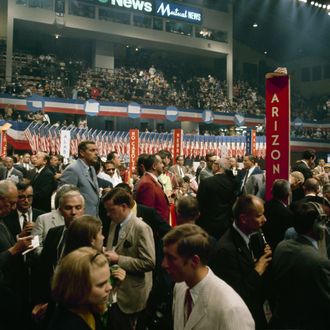
When we first heard talk of a “brokered” or “contested” convention during the 2016 invisible primary, it was just a quadrennial amusement, mostly associated with the sheer size of the early GOP presidential field. Wouldn’t it be cool, pundits thought, if none of these jokers can get a majority and we get to see a real convention instead of an infomercial?
As the GOP field was quickly winnowed, a whole new and more serious rationale for a contested convention came into view: a convention with no “putative nominee” running the show, and moreover, with an opposition still fighting to stop the front-runner. Suddenly, a knowledge of the usually boring and not terribly significant convention rules and procedures became a very valuable commodity in Beltway chatter, and all sorts of lurid scenarios blossomed in the fevered imaginations of would-be “brokers” and their journalistic fans.
Initially, the vision was of a convention with big, brawling, unlimited deliberative powers that could do any damn thing it wanted, particularly after the legal obligation to follow primary and caucus results was impatiently sloughed off at the end of a pro forma first ballot. So party elites didn’t want Donald Trump as the nominee? No problem, so long as he didn’t come to Cleveland with a majority of delegates bound to him. And even then, maybe the elites could manipulate the rules and disappear that majority! Anything seemed possible: A Romney nomination! A Paul Ryan nomination! A heroic effort by the party’s wise leaders to turn a general-election disaster into one long snake dance to the White House!
But as the reality of a contested convention has drawn nearer, in a context where it would likely involve Donald Trump as the favorite of a plurality but not a majority of delegates, the willingness of party elites to pull off some backstage coup in Cleveland has notably abated. Earlier this week, House Speaker Paul Ryan, who would under normal procedures chair the convention, came very close to a Sherman statement (named after William Tecumseh Sherman’s 1884 disclaimer that “I will not accept if nominated and will not serve if elected”), ruling out not only himself but any other “dark horse” nominee who did not compete in the primaries:
“I’ve been really clear about this,” he said. “If you want to be president, you should run for president. We should select our nominee from among the people who are running for president. Clear and simple. So no, I am not going to be the president. I am not going to be the nominee.” He added, “I am not going to become the president through Cleveland.”
Now today a new report from NBC based on interviews with members of the RNC Rules Committee showed horror at the idea of a “dark horse” spreading rapidly among these ultra-insiders:
“Ridiculous — not happening,” said one Rules Committee member, asked about the prospect of candidates getting on the ballot who did not run this year.
“There’s no way in hell that any of these candidates — who have worked this hard and spent this much money — are going to say, ‘OK, now, for the good of the party, I’ll sit down and let’s bring back Mitt Romney,’” said the insider. “That’s a fantasy world — there’s zero chance of that happening.”
Another committee member said creating a path for a new candidate would lead to a party meltdown …
Indeed, most of the 19 Rules Committee members reached by MSNBC opposed any rule enabling new candidates to run at the convention. Only three backed a rule allowing new candidates to run.
So if it’s considered an outrageous offense to primary voters to bypass all of the candidates they’ve voted for, you have to figure at some point it could prove toxic to elevate a candidate who has been regularly defeated as well. And that could become a fatal problem for John Kasich, who is extremely likely to arrive in Cleveland in third place in pledged delegates. Is the convention really going to nominate the left-most (as perceived, anyway) candidate in the whole field after he’s lost 35 or 40 or so primaries and caucuses? It’s hard to imagine any degree of late-primary momentum that’s going to make that look any more acceptable than a Ryan or Romney nomination on a second or third ballot.
So the GOP lurches toward a convention where the only feasible outcomes are probably going to be a Donald Trump or (if he can finish a close second while denying Trump a majority) a Ted Cruz nomination. This will make some Republican Establishment types crazy. But even party elites now seem to understand that this is the wrong year to assert their power to overrule the GOP rank and file. And so, to take in vain the name of the political-science tome that is going to need a revised edition after this cycle ends, “the party” may “decide” it has no power to decide at all.






























